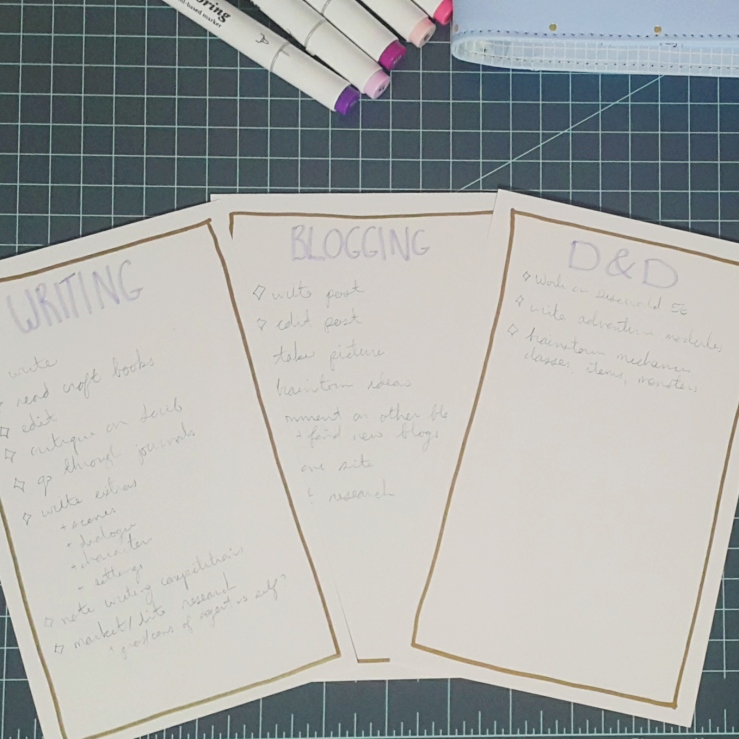
This is the third and probably last post related to Barbara Sher’s book Refuse to Choose (read my review). Today I’ll be discussing the idea of the Focus Board or the Rotating Priorities Board.
The Idea
The Focus Board is a very useful tool for multipods like me who have a basic set of interests that tend to cycle around. Yes, I have interests that come and go only once, but many of my hobbies are mainstays. The intensity of the interest I have for them will wax and wane, but these few have never dropped off the radar altogether.
Currently, my Focus areas are; Writing, Crafting, D&D, and Blogging. Back when I first started the board, I had Health instead of D&D, but that’s changed over the last few months and so I’ve updated my board. That’s perfectly fine and exactly what this tool is supposed to do.
Why Rotate?
The reasoning is straightforward. You have several categories of things you’re interested in, and you want to make progress in each one, but if you try to schedule or focus on one until completion, you often find you can’t do that. A more specific example might be that you want to write a short story. That has steps and requires several days or weeks of solid work. You’re happy to do it, and it’s something you’re really interested in, but you have other things that occasionally creep up on your interest-o-meter (my word, bam).
The solution? Rotate.
In Practice
Let’s break it down further. I want to write a short story. I’m writing and all is fine and well until the third day when my interest begins to wane. Oh no, there goes that idea, I think to myself sadly, shelving the story as I move on to the paper dragon project that is so awesome I can’t stop thinking about it. Just at that moment, anyway.
But I don’t have to shelve the story. What I should do is put the “Writing” sheet underneath and put the “Crafting” sheet on top, work on the dragon until that interest fades, and then pick up the story again. If it’s been a really long time since I’ve written and I haven’t gotten the bug, there might be another issue than just interest. Maybe it wasn’t the story I needed to tell, or maybe writing isn’t my thing. That’s another issue for another post. This board is for things that DO come back around.
I always come back to writing, even if my interest wanes for a week or two. I always have a crafting project I’m doing at any given moment, be it knitting, paper craft, or bullet journaling (which I consider crafty). Lately, I’ve been creating and planning a lot of D&D related stuff, so I put that in, and blogging I keep separate from writing for my own purposes.
How to Make the Board
You can do this any way you want. In Korea, I made these really nice squares of colored paper that I pinned to my bulletin board at home.
On the top of each square I would write the title, like “Writing,” and under that I would list the things I could do to advance the goal I had for it.
In writing I might have; writing, reading how-to novels, novel research, editing, critiquing or reading others’ critiques. For blogging I have; write blog posts, edit existing drafts, take pictures, comment and network on other sites, and improve my site overall.
In crafting I have; knit, work on paper project, and make journal layouts. For D&D; write an adventure, work on my campaign, work on my characters for the games, watch DM how-tos online, and read the guidebooks.
Each of those things would help me work towards whatever goal I had in mind. You could make more concrete steps in a sequential order, or have only one or two or ten or twenty items you could do. It’s up to you and what your needs are.
You can have these as notes on your computer desktop, as physical paper on your wall or in a planner, or whatever works for you. I love this system because I have one up top prominently displayed that I’m very interested in at that moment, but if I lose interest, I move it out and move another up. There’s no guilt and there’s no pressure because I know it’ll come back around. For multipotentialites, forcing interest past its natural curve is nearly impossible, and often causes us to lose that interest altogether when it’s been tainted by guilt. So don’t do that.
I highly encourage you to try it. Even if making stuff isn’t your shizz, just making sticky notes on your computer that you’ll see when you start your day can be enough. It doesn’t have to be fancy. It just has to work for you.
If you give it a shot, let me know! What are your Focus areas?

